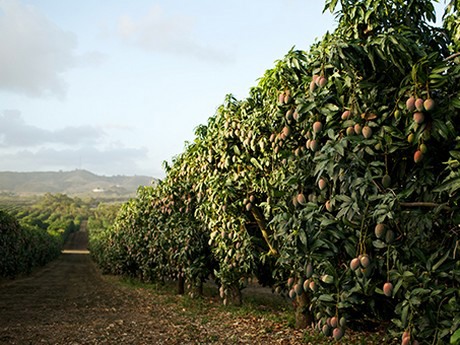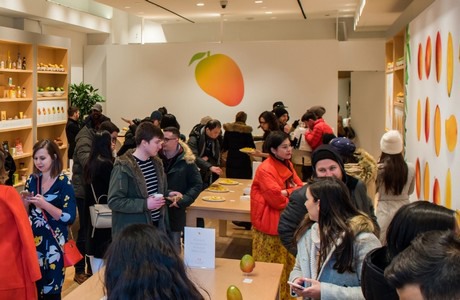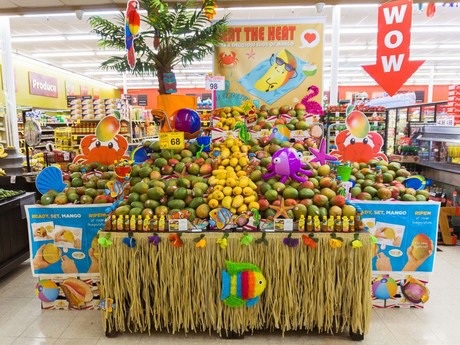On Thursday May 30, the National Mango Board (NMB) hosted a free webinar to provide an insight into some of the methods and trends the organization sees when it comes to promoting mangos. The NMB's Director of Marketing, Valda Coryat was the host of the webinar and shared an outline of what the NMB has done in regards to increasing consumption of mangos.
"Over the past seven years, the number of homes purchasing mangos has risen from 5.3 percent in 2011 to 9.5 percent in 2018 due to the NMB Programs," Coryat said. "Part of this success is because the National Mango Board has worked to focus on mangos as a brand." She went on to list the four main strategies the NMB has used to do this:
• Focus resources on consumers with the greatest potential.
• Reintroduce mangos to the U.S. consumer in a compelling way that piques their interest.
• Entice as you educate.
• Drive mango awareness and relevancy all year.
Reinvigorating the 'mango' brand
The 'curious' grocery shopper and the millennial were two of the biggest consumer groups the NMB identified that have the greatest potential. Hence, they have allocated more resources to promotions targeting these groups. "We have presented mangos in a way that is fun and at the same time beneficial for physical and emotional health," Coryat shared. "We have also gone from multiple creative styles in our marketing and communication to aligning all that we create around one visual, one voice, one brand."

Another aspect that the NMB has capitalized on is the use of 'influencers' who they say has helped to liven up the mango category, including combining their efforts with health benefits. "One example was in February 2018, when we launched the 'How to cut a mango' campaign," Coryat recalled. "This was combined with Valentine's Day promotions where consumers were drawn to the vibrant colors as well as the education on how to cut mangos in an enticing way. We have continued this model for subsequent holidays and also stepped up our efforts to highlight the nutritional benefits."
Connecting to culture
There are a number of ways the NMB has connected consumers with mango culture. This can be by introducing consumers to the countries which grow mangos, but can also be related to the US food culture and also through social media on platforms such as Instagram.
"In 2018, the NMB brought a team of influencers out to Ecuador to present how mangos are cultivated in their country of origin," Coryat explained. "Through the US food culture and on social media, we have also been focused on introducing mango promotions during holiday periods. By doing this, we educate consumers on ways they can innovate with traditional meals served during holidays throughout the year."
Mangos are available year-round
One of the most significant focal points for the National Mango Board is building awareness that mangos are available year-round. Coryat shared that according to a recent survey, only 17 percent of mango buyers are aware that mangos are available year-round. She said that the Board has stepped up promotional efforts during holidays that are not typically associated with mangos, such as Christmas and New Year. The NMB even launched a pop-up store in New York City during the winter. Designed in the style of an Apple store, the "Mango" store provided samples and education on mango varieties and availability in a fun atmosphere complete with a mango playlist.

The one-day mango popup store in New York City.
"As a result of our year-round media and social media efforts, we recorded a 13.2 percent increase in impressions between March 2018 versus March 2019," Coryat said. "We also created a retail and foodservice strategy in an effort to help them when they wish to promote mangos."
In the retail arena, the NMB said it has provided resources in the areas of product quality, mango placement in the store, and also a relatively new area - the Retail Dietitian Program. For example, Coryat explained how product placement can help not only to boost mango sales, but also to highlight the fact they are a year-round fruit. "We have encouraged retailers to take mangos out of exotics and place them adjacent to high traffic fruit, such as stone fruit in summer and citrus in winter," she said. "This also helps to bring mangos into the mainstream fruit varieties."
"Something that is quite new is the Retail Dietitian Program," she continued. "This involves highlighting the nutritional benefits and also providing tools like recipes and tips on how to select and prepare mangos."
According to the NMB, foodservice has been an important area and often one where consumers try their first mango. Therefore, the NMB has provided tools to help foodservice companies as well, including ensuring adequate mango supplies when a seasonal promotion is activated, for example. Other ways the NMB said it has helped foodservice is by educating chefs, monitoring challenges such as food delivery, demand for ingredient transparency and labor challenges.

Mangos now in 'proliferation' stage
In conclusion, Coryat pointed out that mangos have now progressed into what is described as 'proliferation'. This is the third of a four tier scale which groups fruits into their market penetration and places mangos in with fruits like watermelons, grapes, and berries. The four stages are: inception, adoption, proliferation and ubiquity.
"Mangos have seen a steady increase in menu penetration since 2008," she noted. "Mangos are projected to be found in almost half of casual dining menus by 2022. Our aim is to continue to bring mangos from an exotic fruit into the mainstream where they are enjoyed by all consumers."
More information about the webinar, including links to content can be found here.
For more information:
Angela Serna
National Mango Board
Ph: +1 (407) 629-7318
aserna@mango.org
www.mango.org
